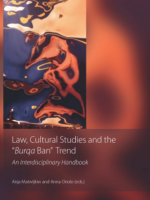Burqa bans impair women’s rights and gender equality
The “burqa ban” in Denmark impairs both women’s individual rights and the principles of gender equality. A Danish law that took effect on August 1, 2018 bans the wearing of any garment in a public place that hides the face, unless it is for a recognized purpose. Four other European countries have passed national legislation against full-face coverings in public, while an additional five countries have national partial bans. In a new book an in-depth account of the "burqa ban" trend, bringing together law and cultural studie, Robin May Schott explores the Danish ban. Examining legal and feminist debates, this chapter highlights the fundamental conflict between religious rights and equality rights in Denmark that forms the background to these debates.
Schott argues that the burqa ban hides the stakes in this underlying conflict. Both politicians and public debates displace the conflict between religion and equality onto an issue that affects only an extremely tiny group of women. In the process, they misrepresent the nature of this conflict. Both at the superficial and the fundamental levels, it is not only women’s individual rights, but also the principles of gender equality and opposition to sexist oppression which lose out.
DIIS Experts


